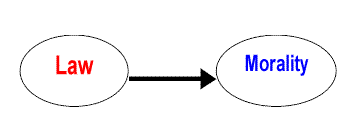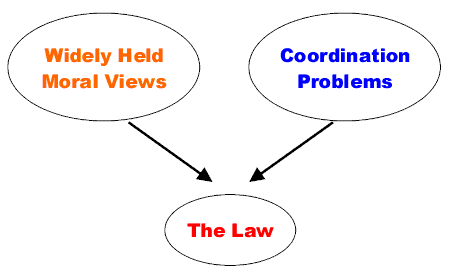Part 2: The Minimal View of Law
The disagreement between the positivist and naturalist primarily concerns the relationship between law and morality. Positivists hold that they are separate spheres (perhaps overlapping by coincidence). Naturalists hold that they are mostly the same (though some laws may be morally neutral). Without resolving this difference, there still seems to be (at least for our purposes) some room for agreement between the naturalist and positivist. Both can agree that a view of morality and law which holds that we can identify something as right or wrong based upon whether or not it is legal or illegal, is false.
 For example, Jones is starving and steals a loaf of bread from a store. Upon hearing this Smith claims that Jones was morally wrong to steal. If we were to ask Smith why Jones was morally wrong to steal the bread he might say something like: “We know it is morally wrong to steal because it is illegal to steal.”
For example, Jones is starving and steals a loaf of bread from a store. Upon hearing this Smith claims that Jones was morally wrong to steal. If we were to ask Smith why Jones was morally wrong to steal the bread he might say something like: “We know it is morally wrong to steal because it is illegal to steal.”
We might represent this view that the law informs morality as follows:
Hence since what the law says yields morality, then because stealing is illegal stealing is also morally wrong. There are numerous counterexamples to this view of equating what the law says about an action with what morality says about the same action. For example, if one were to hold that we can determine what is morally right or wrong by appealing to what is legal or illegal, then one would be committed to the proposition that slavery was morally right because the law said it was legal. Though I cite just one example here, for further examples consider how some of the laws from history as well as current laws square with your intuitions of what is morally right and wrong.
Positivists would reject the above because they believe law is separate from morality. Naturalists would reject it because the above description entails that no law can be immoral. So what might both agree on about the relationship between law and morality? First, they would agree that what law states is not sufficient to tell us what is morally right or wrong. Second, both could agree that law making in practice accomplishes two different functions.
1. The law solves problems of coordination.
For instance, the law tells us to drive on the right side of the road. Notice, this sort of law has nothing to do with morality as it is no more moral for the law to tell us to drive on the right side of the road as it would be if the law said to drive on the left side of the road (as in England). A great deal of laws are of this first sort. They do not reflect any moral views whatsoever but simple provide guidelines to solve non-moral problems like which side of the road to drive on.
2. The law reflects the very core of our moral views.
For example, laws against murder and theft are informed by a deeply and widely held moral belief that it is wrong to murder. In this way the law acts as a way for us to formalize our moral views and give them “teeth” such that violators are identified and punished. This is not to suggest that all moral views become laws, but rather that those moral views that are widely accepted tend to be reflected in the laws.
We might represent this view of the law's function as follows:
 In a democracy like the United States , we can identify many laws that derive from moral beliefs. For example, in many areas it is illegal to buy liquor before 1 p.m. on Sundays. Clearly, laws such as this do not solve coordination problems as there is a supply of liquor, a demand for liquor, and stores willing to sell liquor on Sunday morning if the law allowed. Laws such as the prohibition of liquor sales on Sunday morning were the result of a widely held moral view that it is wrong to buy or consume liquor on a day when one should pay respect to religious worship. This is not to say that the law currently reflects a widely held moral view (many people do not think it is wrong to buy liquor on Sunday morning), but this was the origin of the law and the motivation of the law makers. As a practical matter, laws that derive from widely held moral views historically will change after the moral view changes.
In a democracy like the United States , we can identify many laws that derive from moral beliefs. For example, in many areas it is illegal to buy liquor before 1 p.m. on Sundays. Clearly, laws such as this do not solve coordination problems as there is a supply of liquor, a demand for liquor, and stores willing to sell liquor on Sunday morning if the law allowed. Laws such as the prohibition of liquor sales on Sunday morning were the result of a widely held moral view that it is wrong to buy or consume liquor on a day when one should pay respect to religious worship. This is not to say that the law currently reflects a widely held moral view (many people do not think it is wrong to buy liquor on Sunday morning), but this was the origin of the law and the motivation of the law makers. As a practical matter, laws that derive from widely held moral views historically will change after the moral view changes.
This minimal relationship says that some laws are solutions to coordination problems and that other laws are derived from widely held moral views and therefore the fact that something is the law is still subject to the question “Is this law moral or immoral?” One further issue to point out concerning this relationship between law and morality is the limited nature of the relationship. Though many of society's widely held moral views do become law, this is not to say that every widely held moral view ought to become law. In other words, we might all agree that behavior X is immoral, but still hold that X is not the sort of behavior that should be illegal (even the natural lawyer can admit this). We might conclude this for any number of reasons, including the practical difficulty or cost of enforcing a law against X. For instance, we may conclude that adultery is immoral, but that it is impractical to try to enforce a law against it.
For the natural lawyer, this view is minimally acceptable because it accepts and allows that many laws are informed by morality. For the positivist, this view is minimally acceptable because it does not require any connection between morality and law. Instead, it simply acknowledges that the motive behind many laws is a moral view. I suggest here that both would accept this minimal view of the law because this depiction is silent on the issue of disagreement. While both can admit that some law is a response to coordination problems and other laws are motivated by moral views, they will still disagree on what this means. The positivist will still assert that something can be law even if it conflicts with moral views accepted by 100% of the citizenry, and the natural lawyer will still assert that nothing is law if it conflicts with morality. For our purposes this minimal view bridges (or perhaps glosses over) this disagreement and provides an understanding of what law is and how it relates to morality. To review this minimal view of law admits the following about the relationship between law and morality:
- What the law allows or prohibits is not conclusive on what is morally right or wrong. Each law is still subject to the question of whether it is a moral law or an immoral law.
- Widely held moral views are often reflected in laws that enforce those moral views. Hence, if something is deemed moral or immoral, it gives some reason for us to change laws to reflect what we should or shouldn't be allowed to do.
- Determining something is immoral does not necessarily mean that it ought to be illegal. Though law does reflect widely held moral views, law making must take into account the practical costs and difficulties of enforcement in determining if something should be illegal.

